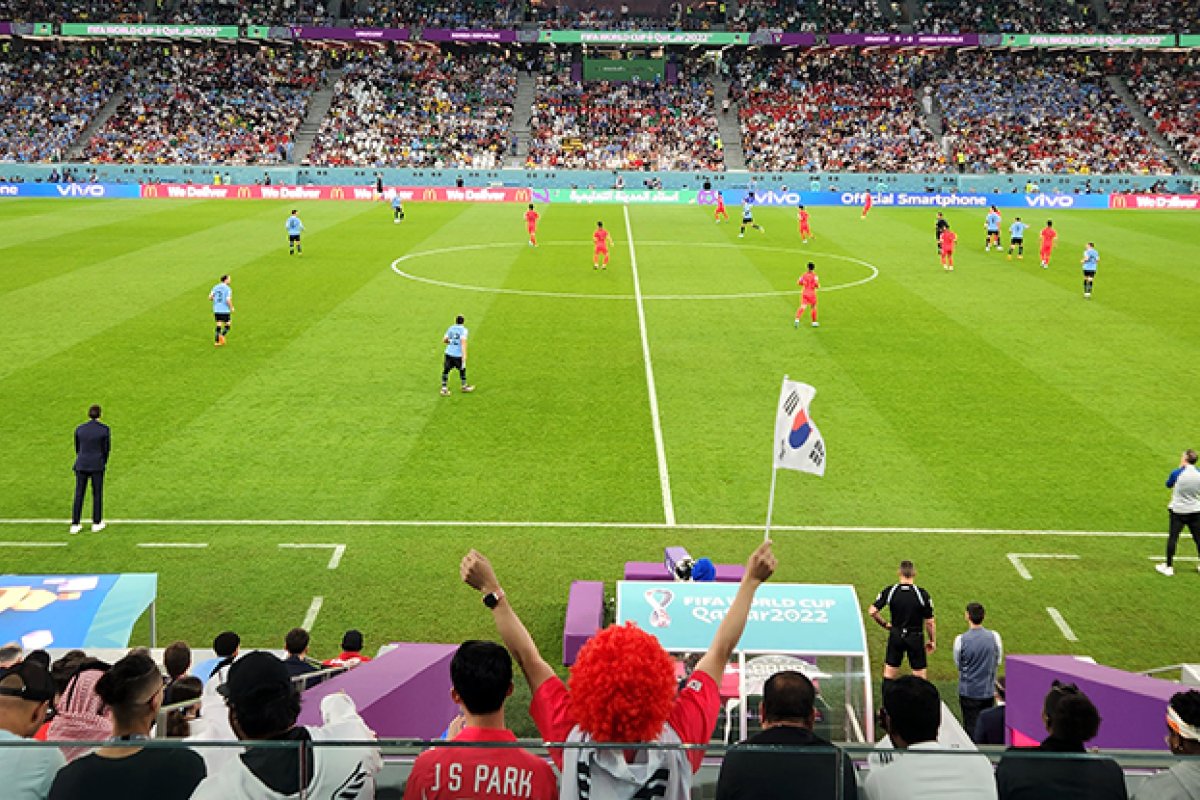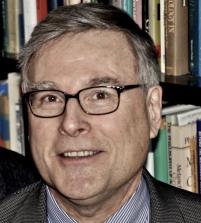
Loyalty and the World Cup
Observing loyalty to loyalty at the World Cup invites us to reevaluate our public life.
§1. Sightings at the World Cup?
After the endless emails seeking endless donations to political candidates hither and yon, and after a sometimes chaotic, sometimes surprising, midterm election here in the USA, a global break was sorely needed. And so it is with the World Cup 2022, the planetary spectacle of athletic prowess, national pride and sorrow, and endless political and social intrigue. To be sure, the profound problems of this Cup hosted by Qatar are well-known and documented. Yet it is also the first World Cup held in the Arab and Islamic world.
What does this World Cup have to do with the study of religion? Let us probe that question with the help of an American philosopher renowned in his own time, but now, alas, all but forgotten. This philosopher, Josiah Royce, coined the term "The Beloved Community," popularized by M.L. King, Jr., as well as writing works of metaphysics, ethics, logic, and religion. Royce's Objective Idealism is in many ways out of step with our times, but I think he still has something to teach about the place of loyalty in social life, the World Cup, our nation, and in religion as well.
§2. Loyalty: Devotion and Toleration
One signature idea in Royce's corpus is his conception of loyalty. In The Philosophy of Loyalty, The Sources of Religious Insight, and The Problem of Christianity, he asked the reader to ponder the place of devotion to a cause in life. Like James and other pragmatists, Royce thought that an "idea" is a plan for action. Loyalty, devotion, is elemental to any idea that can stand its ground within the flux of time. An object of thought, any cause, lacking devotion fades into the background of the whirl of human passions. In that way, loyalty is basic to a meaningful life because our purposes, our causes and intentions for our lives, wilt without loyalty to them.
We are active beings, and without loyalty to some cause bigger than ourselves—religious, political, artistic, cultural—life lacks coherence and actuality. For Royce, our finite consciousness is a component in the Absolute, itself an experiencing self. With that idea he is clearly out of step with our anti-metaphysical and non-idealist age. But since we cannot live without devotion to some cause, what is admirable is a person's or community's loyalty to their cause. The task of life, then, is to examine critically our own loyalties and to commit ourselves to struggling against suffering and evil. The question is not whether to be loyal, but to which causes should we be loyal, and can we strive for these causes in the face of sorrow. Royce even wrote about "the religious mission of sorrow" (a claim that needs considerable revision in our age!) The struggle of life is, further, a sure sign of the human need for deliverance, salvation, by the master of life, as he calls it, lest we are smothered in false causes and warped devotions.
Royce further argues that the loyalty needed for the Beloved Community, which is the source of human salvation, is loyalty to loyalty itself. But what, in the world, does that mean? We know that loyalty is an abiding devotion to a cause, a faith; loyalty to loyalty itself is also tolerant of those whose cause escapes our comprehension. Loyalty to loyalty unites "strenuous devotion to a cause to the truth that one sees with tolerance for the faiths whose meaning one cannot understand."1 It is this loyalty that characterizes the Beloved Community and reconciles people to each other and to the master of life and so is an answer not only to our social existence but also the religious problem.
§3. The World Cup and Loyalty to Loyalty
Watching the Morocco/Portugal quarterfinal game, I was struck by something that recalled Royce's philosophy of loyalty. It is not odd to see a European or American or Latin American footballer (soccer player) make the sign of the cross when entering or leaving the pitch (the field). So common is the act that we quickly dispel its significance and chalk it up to mere routine. In the Morocco/Portugal game, it was striking, at least to me, that Moroccan players while waiting to run on to the pitch would pray not in prostration but by holding their hands before their faces and uttering their prayer. I was taken with this act of Muslim piety and while I cannot grasp its full significance, I was riveted by the loyalty, the faith, involved. In the players’ act was loyalty, a loyalty that I had to endorse as right for them as a fusion of devotion to my own cause with toleration of their cause.
So too do the fans in the stadium who ardently, loudly, cheer for their team, but also, at least at the World Cup, understand and endorse, tolerate, other peoples' devotion to their teams and cheer for their stars. In Royce's terms, this was an embodiment of loyalty to loyalty. It might be too much to say there was a glimpse of the Beloved Community and the social redemption that it signals. Yet, what became manifest was not just the truth and possibility of tolerant social life but also the plight of our nation, my nation, and how we must seek some form of social reconciliation.
The truth that I dimly grasped in the match was something about the possibility of religious tolerance. I can, we can, come to endorse the loyalty of other peoples' loyalties even if we cannot abide by them. This is not a bland toleration where every cause is equal and easily accepted or ignored. Again, one must struggle against what thwarts the Beloved Community and what is thus against loyalty to loyalty. The religious toleration evoked by the game is colored by what Lee Yearly aptly calls "spiritual regret," that is, the virtue, the excellence of character, to see and feel the power of another religion, but a religion that one cannot really live oneself.2 I felt and endorsed the power of the Moroccan players' loyalty to their religious cause, but I could not live it because their cause, that idea, is not a plan of action for me and, in truth, neither is mine for them. But toleration tinged with spiritual regret is a virtue I can struggle to embody and hope that others do as well. In polarized societies like the United States, apathy, intolerance, and fanatical devotion are more common than loyalty to loyalty. Catching a glimmer of this virtue at the World Cup invites us to reevaluate our public life.
§4. The Strenuous Idea of E pluribus unum
Idealists of Royce's ilk would say that in truth the Absolute works its way through history and to join its cause with loyalty to loyalty is to labor for human social reconciliation and to be in accord with the Absolute. One can tolerate Royce’s faith in the movement of the Absolute, maybe even with a bit of spiritual regret, without loss of his insight. If this nation, which touts its religiosity and democracy, is really dedicated to the idea that it is "out of many, one" (E pluribus unum) as the national motto puts it, then that idea must be a plan for action. That requires one's enduring devotion to that cause and toleration of the many other ways of serving it. As things are, lacking loyalty to loyalty, devotion and toleration, the nation is tearing itself asunder and sliding into a chaotic, warlike clash of identities. The question is then: can we respond loyally to the nation's need?
1 Josiah Royce, The Sources of Religious Insight (Washington, DC: Catholic University Press, 2001 (original 1912): 296.
2 See "New Virtues for a New World of Diversity" by Diane Winston, Chicago Tribune July 7, 1995, at https://www.chicagotribune.com/news/ct-xpm-1995-07-07-9507070038-story.html. Accessed Dec 12, 2022, 2:30 p.m.
Featured image: "2022 FIFA World Cup Korea Uruguay 04" by Republic of Korea is licensed under CC BY-SA 2.0.


